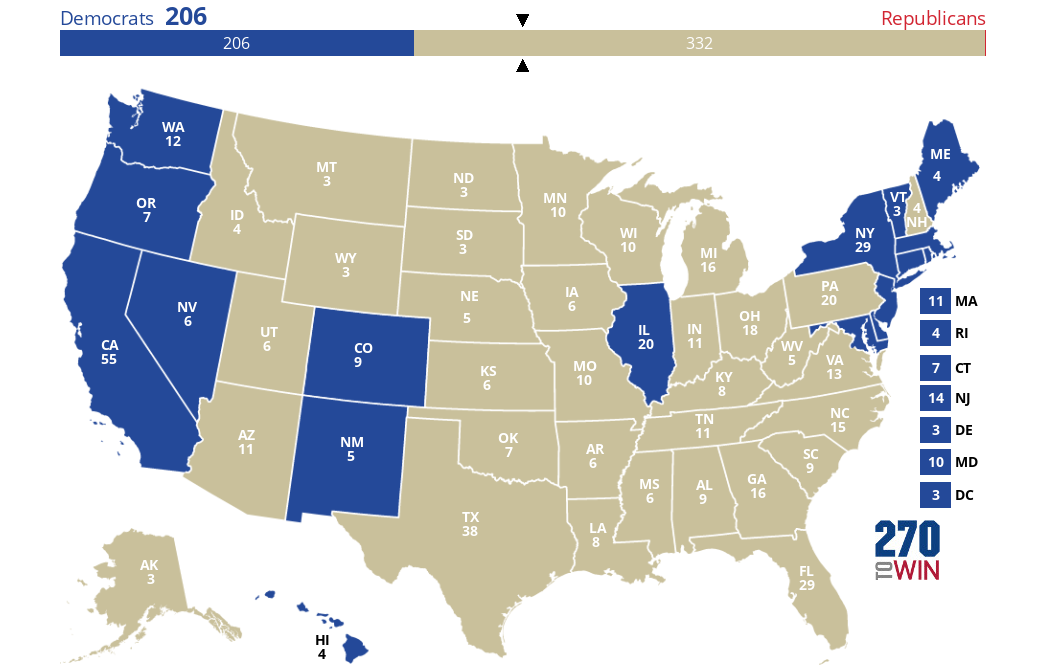‘It’s going to be very difficult to explain… why you’re casting California’s electoral votes against the wishes of a supermajority of Californians in favor of Donald Trump…’

(Ben Sellers, Liberty Headlines) Once considered a swing state, increasingly liberal Colorado dove headfirst into the partisan divide by joining a radical effort to eliminate the Electoral College in presidential elections.
Newly elected Gov. Jared Polis already had expressed support for the Democrat state legislature’s proposal to join the National Popular Vote Interstate Compact. On Friday, Polis signed the bill, formally adding Colorado to the compact, Roll Call reported.
The agreement means Colorado would pledge all of its electors to the candidate who wins the popular vote nationally rather than letting its own voters determine whom the state will support.
It follows closely on the heels of the 2016 election in which Hillary Clinton officially received 2.8 million more votes than President Donald Trump while still handily losing the election.
Trump received 306 of the 538 total electors, with Clinton receiving only 232.
The popular-vote compact would be triggered only if it were to reach the 270 electoral votes needed to win an election. Until then, states may continue to assign their electors according to the votes of their own citizens.
Colorado’s addition puts the total number of would-be electors in states supporting the compact at 181.
So far, 11 other states and the District of Columbia have joined: California, Connecticut, Hawaii, Illinois, Massachusetts, Maryland, New Jersey, New York, Rhode Island, Vermont, Washington and the District of Columbia.
All the previous states have supported Democratic presidential candidates in every election since at least 1992.
Colorado, on the other hand, was still considered a red state during the administration of George W. Bush and backed the Republican president in his 2000 and 2004 elections.
Colorado Public Radio noted that the popular-vote compact would have changed the state’s electoral vote twice in the past 10 elections—in the 1996 race where it supported Sen. Bob Dole over incumbent Bill Clinton, and in the 2000 race between Bush and Al Gore.
But despite its conservative, rural strongholds, the growth of far-left enclaves like Denver and Boulder has drastically shifted the political balance in Colorado since the Obama era.
Polis, a self-funded billionaire, made history after being elected last year as the country’s first openly gay governor. He welcomed the support of socialist Sen. Bernie Sanders, I-Vt., on the campaign trail.
Two other states, Delaware and New Mexico, currently have legislature-passed bills supporting the popular-vote compact that are awaiting their governors’ signatures, Roll Call reported.
Barry Fadem, president of the California-based nonprofit National Popular Vote Inc., which is leading the effort, told Roll Call that Oregon, Maine and Nevada are also in the group’s cross-hairs.
The addition of those five states would put the total at 206 electoral votes.
Fadem said that the effort was unlikely to reach 270 prior to the 2020 election, but he was optimistic about 2024.
However, if the compact were to take effect, it almost certainly would lead to federal court challenges.
Electoral College defenders maintain that the system is necessary for smaller states and more rural ones to have their voices be heard rather than letting national decisions be railroaded by only a handful of mega-states.
Norman Williams, a law professor at Oregon’s Willamette University, told Roll Call the measure could potentially come into conflict with the rules outlined in the U.S. Constitution.
Although states are free within the Constitution to choose their own electors, an inconsistency in the way those electors are determined—such as what happens if one state’s recount rules were triggered and resulted in a reversal of the popular vote—would then have national implications and undermine faith in the entire system.
Another example may be the differing approaches to ballot-harvesting in the last election.
While California passed a law prior to the 2018 race that permitted the third-party collection of absentee ballots—and reversed the election-night victories of several Republicans by continuing to count absentee ballots long afterward—a Republican victor in North Carolina was denied certification because the same practice was deemed fraud.
Conservatives criticize the popular-vote initiative as yet another blatant ploy to throw disproportionate power to sanctuary states that routinely turn a blind eye to illegal immigrants and other ineligible voters casting ballots.
Many, including President Trump himself, have questioned the legitimacy of Clinton’s popular-vote win, largely driven by regions that not only refuse to enforce immigration laws or to cooperate with law-enforcement officials, but that allow illegal residents to obtain driver’s licenses and vote in local elections, leaving ballot integrity severely compromised.
Even if poll workers in states like California and New York were to be trusted to follow election laws—despite the weight of evidence to the contrary—Democrats continue pushing to expand their voting base and electoral influence through an open-border policy, effectively violating the existing laws in order to force themselves into power and impose new ones.
As often is the case, however, with the Left’s bad-faith efforts to secure its own power at the expense of democratic norms and institutions, there is always the possibility that a Republican candidate might, one day, win the popular vote—which then would trigger the likely refusal of hypocritical blue states to observe their own self-imposed mandates.
Offering the 2020 race as a hypothetical, Williams said, “It’s going to be very difficult to explain to Californians—to your California constituents as a California representative or senator—why you’re casting California’s electoral votes against the wishes of a supermajority of Californians in favor of Donald Trump.”
Either way, Williams added, the compact inevitably opened the door to voter disfranchisement somewhere down the line.
“That will be true in all of the states that are having to cast their electoral votes against the wishes of how the state voted,” he said.


 Click the map to create your own at
Click the map to create your own at